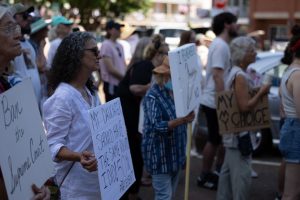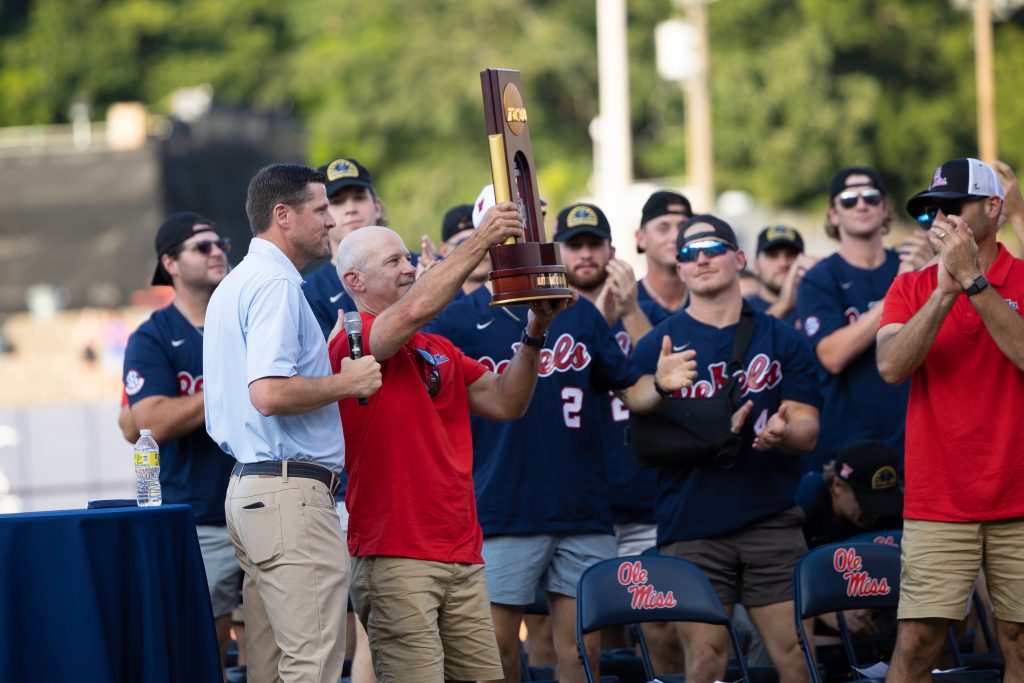
Hundreds of people gathered at Oxford City Hall on Saturday to rally against the overturning of Roe v. Wade.
“Welcome to the world’s longest war – the war over whether or not women own themselves,” Forrest Dillard, organizer of the Oxford Rally for Reproductive Rights, said.
On June 24, the U.S. Supreme Court released its decision in Dobbs v. Jackson Women’s Health Organization, upholding the state’s 15-week abortion ban.
In a 6-3 ruling, the court held that “the Constitution does not confer a right to abortion; Roe and Casey are overruled; and the authority to regulate abortion is returned to the people and their elected representatives.”
During her speech at the rally, Christen Hemmins, activist and chair of the Lafayette County Democratic Party, said that people can stand for equality for women. She also emphasized that women should not have to be “victims or victimized to have body autonomy.”
Though many Mississippians are angry with the court’s ruling, pro-life Mississippians like Gov. Tate Reeves celebrated the decision.
“Mississippi has led the nation to overcome one of the greatest injustices in the history of our country,” Reeves said in a statement on June 24. “Our state’s historic case before the United States Supreme Court was the catalyst for overturning Roe v. Wade and has made the nation safer for children than it was just a few short hours ago.”
The decision made in Dobbs v. Jackson Women’s Health Organization not only overturned Roe v. Wade but also reversed Planned Parenthood v. Casey, which, in part, held that spousal awareness before abortion was invalid under the Fourteenth Amendment because it placed an undue burden on married women seeking an abortion.
Opponents of the ruling in Dobbs v. Jackson Women’s Health Organization view this as a human rights violation that affects women.
“Abortion rights are human rights,” people chanted as they walked around the Oxford Square.
University students split on ruling
When the initial decision was released, a few university students shared their thoughts on the decision. Like Mississippians across the state, UM students differ significantly on the issue.
“I feel like the overturning of Roe v. Wade is an attack on equality and women’s rights,” Savannah Avery said. “It makes me angry and sad for the women who will immediately be impacted with no choice.”
Avery, a senior criminal justice major, believes that women’s rights were diminished the day the court overturned Roe v. Wade. She said there are many circumstances that can surround a woman’s choice to have an abortion, and women should have complete control over their bodies and their decisions.
“I hope that moving forward there will be no decisions made in other Supreme Court cases that will alter the course of fundamental rights that individuals worked hard to achieve regarding racial, gender and social equality,” Avery said.
But that’s not how everyone sees this issue. Supporters of the Dobbs v. Jackson Women’s Health Organization decision believe that the decision will help make the country safer for unborn children and are hoping for more legislation to restrict abortion even further.
“We’re absolutely overjoyed for the lives that are, have been, and will be saved,” students on the executive board of Rebels for Life said. “The Roe and Casey decisions were wrong the day they were decided, and their reversal will finally allow pro-life states to protect the human right to life against its abuse by the abortion industry.”
Rebels for Life is the University of Mississippi chapter of Students for Life, a pro-life advocacy organization. The executive board for Rebels for Life consists of university students: Jack Dellinger, Emily Smith, Lily Martin, Noah Cash and Caroline Underwood.
“We hope to see even further legislation that leads to abortion not only being illegal but unthinkable,” the executive board said. “As an organization, we hope to foster a community that supports women to the point that they aren’t left believing they have to resort to abortion.”
Maddy Ryan, a junior international studies major, said that although women across the country feel the impact of the Supreme Court’s decision, access to reproductive health services was restricted to Mississippi women long before Roe v. Wade was overturned.
“I think it’s wrong to believe our grievances just began. While the country is reeling from a collective betrayal, this feeling is not new for Mississippi women,” Ryan said. “I hope that this ruling brings attention to the reality faced in the South, and that federal leadership is held accountable for their inaction.”
Part of the restriction on reproductive health services has to do with the fact that the only abortion clinic in the state is in Jackson, meaning access to abortions is limited to individuals who can afford to drive to that abortion clinic and those who are able to schedule an appointment.
Ryan believes that when the court makeup changes, certain liberties will be regranted to citizen, but that is a concern.
“I share the very real and valid fear of more civil liberties being overturned to state discretion, but I also think it is a result of a conservative court makeup that will cherry-pick the cases they want to redefine,” Ryan said.
Mississippi has a trigger law that was certified by state Attorney General Lynn Fitch on Monday, June 27. Under this law, which goes into effect 10 days from June 27, abortions will be banned unless a pregnant person’s life is in danger or the pregnant person is a victim of rape and has reported the incident to law enforcement. Anyone who performs or attempts to perform an abortion will be charged with a felony that is punishable by a fine of up to $100,000, up to 10 years in prison or both.













